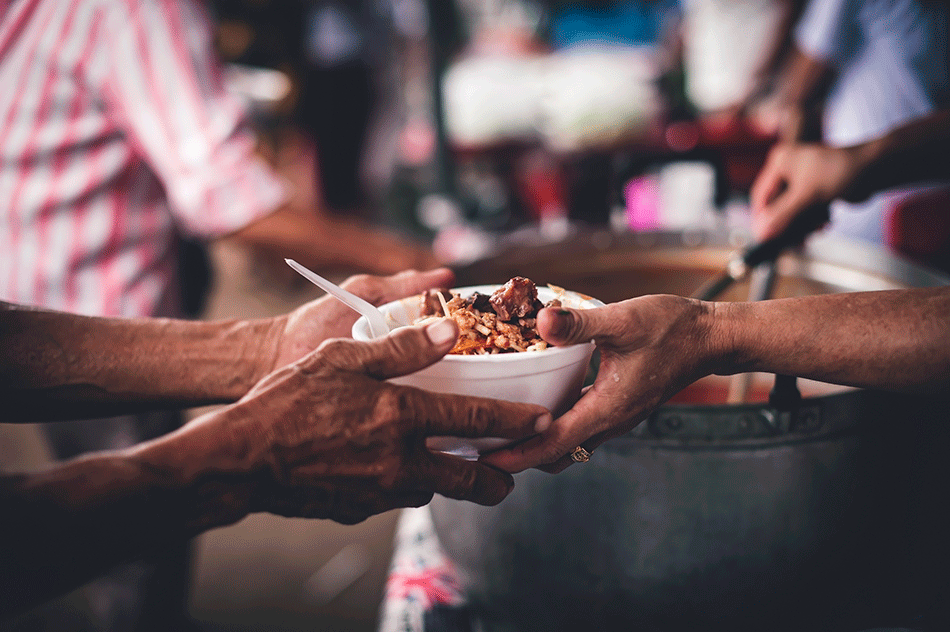By Salvador García Sánchez and Simon L. Dolan
Introduction
“Resilience” seems to be a common term used by professionals in many disciplines. Psychologists and medical experts talk about personal resilience, and corporate analysts, coaches and consultants talk about corporate resilience. After all, not only people but also their corporations need to overcome the state of dystopia1, reaching that of “eutopia”. Dystopia, according to Wikipedia, stemming from the ancient Greek δυσ (dus, “bad”), and τόπος (tópos, “place”), and also called “cacotopia” or “anti-utopia”, refers to a society that is undesirable or frightening. It is often treated as an antonym of “utopia”, a term that was coined by Sir Thomas Moore and figures as the title of his best-known work, published in 1516, which created a blueprint for an ideal society with minimal crime, violence, and poverty. The relationship between utopia and dystopia is in actuality, not one simple opposition, as many utopian elements and components are found in dystopias as well, and vice versa… Dystopias are often characterised by fear or distress, tyrannical governments, environmental disaster, or other characteristics associated with a cataclysmic decline in society. Themes typical of a dystopian society include complete control over the people in the society through the usage of propaganda, heavy censoring of information or denial of free thought, worshipping an unattainable goal, the complete loss of individuality, and heavy enforcement of conformity. Despite certain overlaps, dystopian fiction is distinct from post-apocalyptic fiction, and an undesirable society is not necessarily dystopian. Dystopian societies appear in many fictional works and artistic representations, particularly in stories set in the future. Famous examples include George Orwell’s Nineteen Eighty-Four (1949), Aldous Huxley’s Brave New World (1932), and Ray Bradbury’s Fahrenheit 451 (1953). Dystopian societies appear in many sub-genres of fiction and are often used to draw attention to society, environment, politics, economics, religion, psychology, ethics, science, or technology. Some authors use the term to refer to existing societies, many of which are, or have been, totalitarian states or societies in an advanced state of collapse. Dystopias, through an exaggerated worst-case scenario, often make criticism about a current trend, societal norm, or political system.
A utopia is a place whose existence is impossible (“u” = no, impossible, “topos” = place). Thomas Moore himself, the author of the word, spoke of “eutopia” or “possible good place” (“eu” = good, adequate, and “topos” = place) to designate a necessary and realisable state between utopia and dystopia. Homo sapiens needs to realise the evolutionary state of eutopia that the world undergoes where genuine human values are embedded — this is possible. Activating unconditional kindness in a dystopia of war is not a utopian oxymoron.
In the following paragraphs we share our reflections and suggestions on how to enhance personal and collective values, based on principles rooted in the field of health psychology aims at enhancing resilience. The paper is addressed to all people immersed in one of the many situations of wars and violence occurring today in our dystopian world, and especially to the agents and victims of the current ongoing wars in Israel and Ukraine, as well as tens of other armed conflicts around the world2. The horror, cruelty, and emotional hardship of war is one of the most stressful and difficult situations for any human being to face, and the collective consequences for ethical, economic, and psychological health and well-being are just terrible.
In this paper, we build on the concept of eutopia and its underlying construct of kindness. We argue that it can serve as a base to build personal resilience especially in the dystopian context of war. Personal resilience refers to an individual’s ability to adapt and bounce back from difficult or challenging situations. It involves maintaining a positive mindset, managing stress and emotions effectively, and being able to cope with adversity. Personal resilience allows individuals to face and overcome obstacles, setbacks, and failures, and to continue moving forward in pursuit of their goals and well-being. It involves developing skills such as problem-solving, self-confidence, perseverance, and flexibility. Personal resilience is essential for maintaining mental and emotional well-being, as well as for achieving success and fulfillment in various aspects of life.
Resilience Approached From the Angle of Unconditional Kindness

While there are many suggestions and angles proposed by experts to enhance resilience, an emerging angle is that of unconditional kindness to self and others.
Unconditional kindness goes far beyond mere formal courtesy or good manners. We argue that unconditional kindness is the radical antidote to the poison of hostility, hatred, revenge, and violence; and its short-, medium-, and long-term effects are highly beneficial for eutopic systemic transformation. (Exhibit 1)
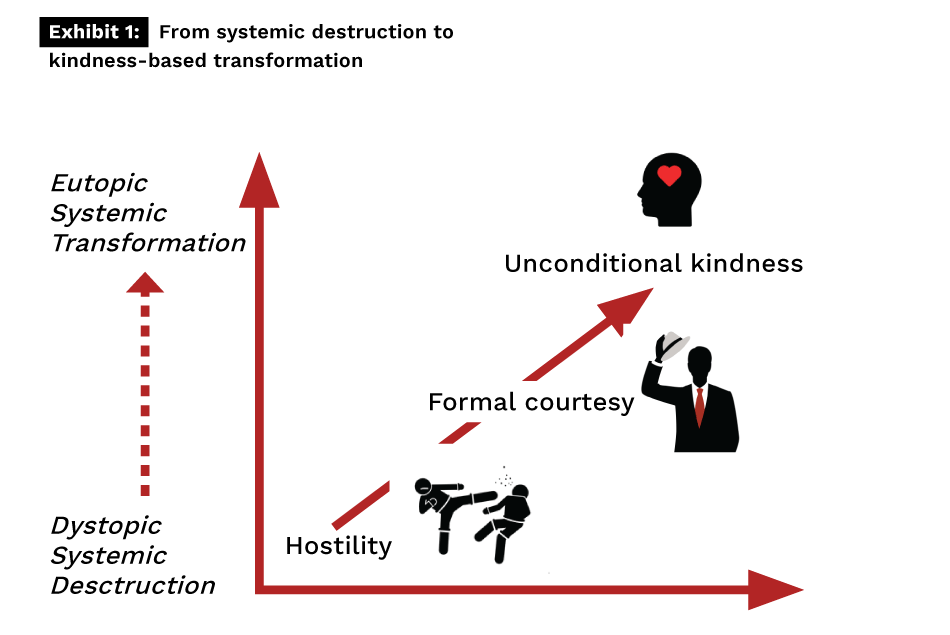
Unconditional kindness refers to taking care of, and being compassionate towards oneself and others under any circumstances; it is the desire to liberate oneself from suffering and free others from suffering, without any other expectations or conditions attached. It is a selfless and genuine expression of love and goodwill towards onself and others, motivated solely by the desire of being more content. Unconditional kindness does not seek recognition, reward, or reciprocation; it is given simply because it is the right thing to do for our personal and collective well-being.
The tree of unconditional kindness
Kindness should be unconditional, or it is not a genuine form of kindness. The metaphor of the tree of unconditional kindness embeds the respective values that are necessary in order to live, coexist, and die in peace. We wonder if there is anything else more important.
We know that the essential elements of a fruit tree are the root, the trunk, the branches, and its fruits. And for its growth, it also needs soil with sufficient nutrients, rainwater, and sunlight. A tree needs to be resilient, since it can be attacked by numerous pests that impede its growth. (Exhibit 2)
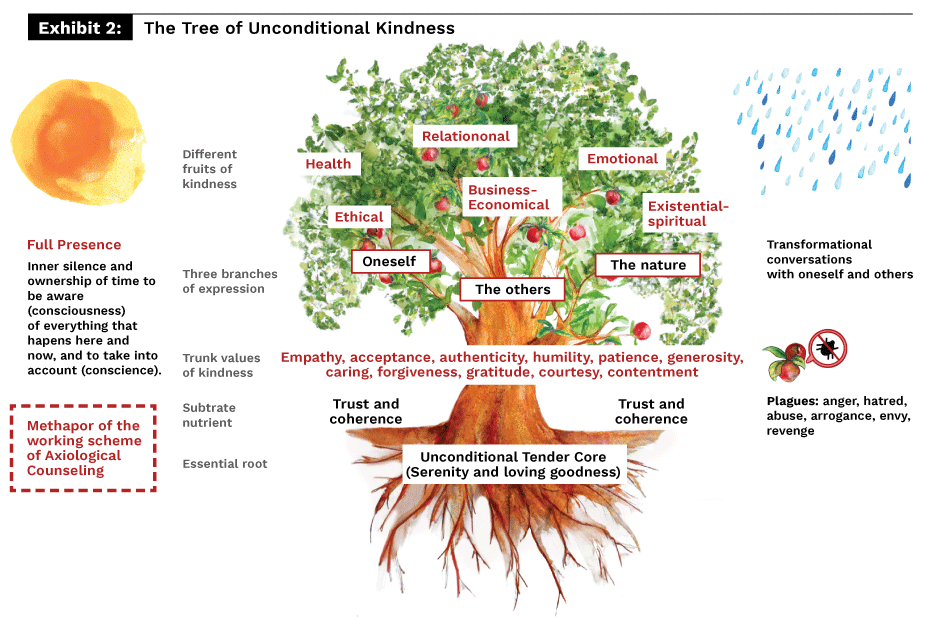
Honouring all the many ancestral traditions that refer to the “Tree of Life” as a tree of knowledge, we can use it in a metaphorical way for an initial approach to the eutopic phenomenon of the possible unconditional human kindness and all its associated values, representing our necessary personal and collective evolution as the species Homo sapiens.
Genuine kindness is pure, unconditional, active acts of love or compassion: It exists and manifests itself from the inside out as a gift or grace of our human nature that flows and empowers its own, and liberates us from our own and others’ suffering.
Obviously, controversy prevails as to whether the essential human nature is silent, peaceful, and kind or, by contrast, it is a wolf for man, noisy, aggressive, and unsympathetic. If Buddha, Machiavelli, Jesus Christ, Rousseau, and Hobbes were to converse on the subject, they would most likely disagree.
However, employing the analogy of the tree, they would probably conclude that, in any case, the human being has seeds of love and hate, and whether or not its best positive essence manifests itself depends on the form of relational values. For the best fruits to be produced, solid, healthy roots and sufficient nutrients, irrigation, and abundant light are required. Let’s elaborate a bit more on this.
The essential root

The essential root of unconditional kindness is grounded in our neurobiology as we evolve as human beings called Homo sapiens. It is from our inner core of serenity and loving goodness and compassion, firm yet subtle and delicate, that we can treat and care for ourselves as genuine human mammals.
As the great Tibetan master Chogyam Trungpa states, “At the core of every human being there is a tender and delicate point”3. His disciple, the Californian psychologist Stephen Gilligan, says that “it is an indestructible core”4. Indestructible means that it is unconditional in character, being especially associated with our inner firmness or solidity to treat ourselves and others well and to face suffering with kindness, whatever its origin, from our inner strength and freedom.
Therefore, we argue that all Homo sapiens have within our being the valuable and surprising gift of an inner space of serenity, kind love, generosity, and awareness of union and interdependence with all that exists that we can call our “Unconditional Tender Core”, highlighting the firm and solid character of this radical tenderness or gentleness, under any circumstance. It constitutes the root of kindness and unconditional good treatment with oneself, of others, and of the rest of nature.
The “only” thing to do to access this root or kind core is to intuit its existence and to free ourselves with benevolence from the armour of fears and adaptive defences that we have accumulated throughout life, contemplating and even using constructively the character with which we move in our different biographical spheres.
The “new” technologies available to us to care for this core root are meditative silence, conscious ownership of time, transformative conversation, understanding forgiveness, gratitude, and joy, which are shown in Exhibit 1. Notice that it has much to do with the sun, rain, and the core values or manifestations of the serene and loving root of the tree of unconditional kindness.
The trunk values of unconditional kindness:
From this radical connection with our peaceful, compassionate, and interdependent essence, the great values of empathy, humility, patience, generosity, care for self and others, understanding forgiveness, gratitude, and joy manifest and grow, constituting the trunk from which the three branches and the many fruits of unconditional kindness grow.
The three branches of expression:
The tree of unconditional kindness has three intertwined branches or expressive dimensions: towards oneself, towards others, and towards the rest of nature of which we are a part. In turn, kindness to those around us has many other possible bifurcations, from kindness in the couple to kindness in the health care system or in sports, to name a few.
Fruits of unconditional kindness:
Kindness has six types of essential fruits, all of them related to each other:
- Biological: longevity and cardiovascular health.
- Ethical: cooperation, equality, fraternity, brotherhood, fraternity, solidarity.
- Emotional: non-aggressiveness, satisfaction, emotional well-being, warmth.
- Relational: quality of bonding, mutual attraction, reciprocity, knowing how to accompany, knowing how to listen, knowing how to ask, knowing how to say no, conflict prevention, recognition, knowing how to have details, courtesy, smiling.
- Existential-spiritual: knowing how to accept, being able to die in peace.
- Business: attracting and releasing talent, commitment, work motivation and positive work environment, team development, and customer and supplier loyalty.
Soil and compost:
The base or nutrient substrate on which the loving roots of unconditional kindness grow is constituted by the other two essential meta-values: trust and coherence.
Trust, as we explain later, is a meta-value of our generative emotional intelligence, while coherence is the meta-value of our pragmatic value intelligence. Without trust no conversation or creativity is possible, and without coherence of action we remain in the colorful clouds. Without the essential nutrients or fertiliser of trust or belief in self and others and coherence or union between what is said and done, the tree can in no way thrive to its fullest splendour.
Rainwater:
The rainwater is necessary for the growth of unconditional kindness; it is the transformative conversation with oneself and others. Without it, the tree remains static and lifeless.
Sunlight:
Sunlight is represented by the experience of full presence, which consists of noticing (awareness) and being mindful (consciousness) of all that is happening here and now within us and in the world around us. Only from full presence can we connect with our indestructible tender core and be able to choose and cultivate with wisdom the values that allow us to act with unconditional kindness towards ourselves, towards those around us, and towards everything around us. Full presence is illuminated from silence and inner space and from the subjective ownership of time here and now. And it is associated with active compassion, mutual understanding and gratitude.
The neurobiological base of unconditional kindness and its’ relationship to resilience
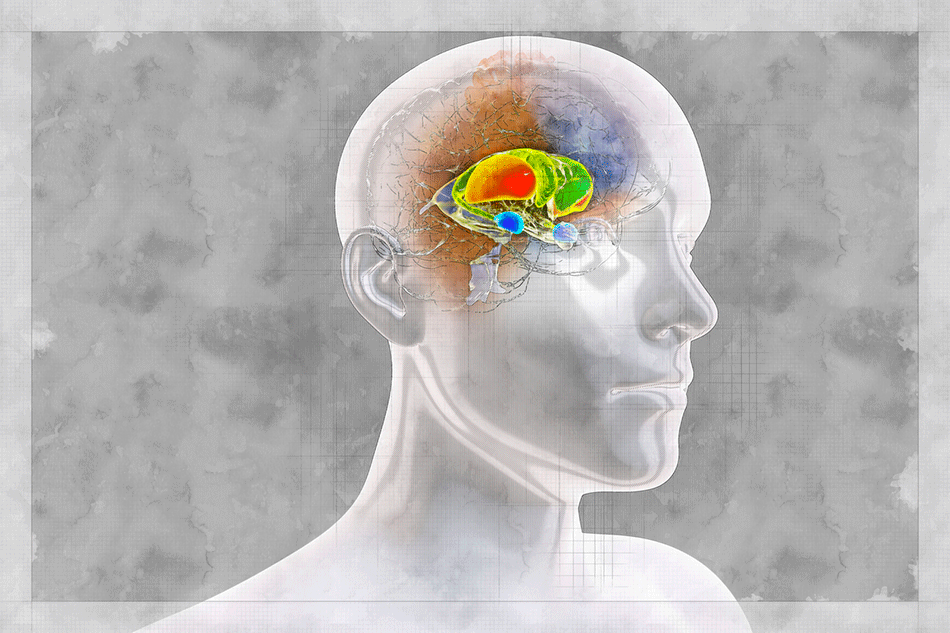
The neurobiology of unconditional kindness involves several regions of the brain and neurotransmitters that contribute to the experience and expression of goodness and empathy.
One important brain region involved in kindness is the prefrontal cortex, particularly the ventromedial prefrontal cortex (vmPFC) and the dorsolateral prefrontal cortex (dlPFC). The vmPFC is associated with empathetic responses and social cognition, while the dlPFC is involved in decision-making and self-regulation. These regions help us understand others’ emotions and make conscious choices to engage in kind behaviours.
Another crucial brain region is the striatum, which is part of the reward system. When we engage in acts of kindness or witness kindness, the striatum releases dopamine, a neurotransmitter associated with pleasure and reward. This dopamine release reinforces kind behaviour and motivates us to continue being kind.
The amygdala, an almond-shaped structure in the brain, also plays a role in kindness. The amygdala is involved in processing emotions, particularly fear and aggression. Studies have shown that when individuals engage in acts of kindness, the amygdala’s response to negative stimuli decreases, suggesting that kindness can reduce negative emotions and promote positive feelings and prosocial behaviour.
Oxytocin, often referred to as the “love hormone”, is another key player in kindness. Oxytocin is released during social bonding and promotes feelings of warmth, trust, empathy, and generosity. It enhances social bonding and strengthens relationships, making acts of kindness more likely.
Finally, mirror neurons are important in understanding and imitating the actions and emotions of others. These neurons fire both when we perform an action and when we observe someone else performing the same action. Mirror neurons help us empathise with others and understand their experiences, facilitating kind and compassionate behaviour.
Overall, the neurobiology of unconditional kindness involves a complex interplay between brain regions, neurotransmitters, and social cognition processes. Understanding these mechanisms can help us appreciate the importance of kindness in promoting positive social interactions and well-being.
So, the conscious practice of unconditional kindness enhances resilience. Kindness is not only a virtue that contributes to positive relationships and overall well-being, but it also plays a significant role in enhancing resilience. When we practise kindness, we benefit not only others but also ourselves. Acts of kindness release hormones like oxytocin and serotonin, which promote feelings of happiness, contentment, and overall well-being. These positive emotions strengthen our mental and emotional resilience, making it easier for us to cope with stress and bounce back from setbacks.
Additionally, kindness fosters social connections and support networks. When we show kindness to others, we build strong relationships and create a sense of community. These connections provide a safety net during challenging times, as we can turn to others for support, encouragement, and assistance. Having a strong support system is crucial for resilience, as it helps us feel less alone and provides us with the resources and emotional support needed to navigate difficult situations.
Furthermore, acts of kindness can also inspire others to be kind, creating a ripple effect of positivity and resilience within a community. Witnessing or experiencing kindness can boost our own resilience by reminding us of the inherent goodness in people and the potential for positive change. It can also motivate us to pay it forward and engage in acts of kindness ourselves, further strengthening our resilience and the resilience of those around us.
The three circles model
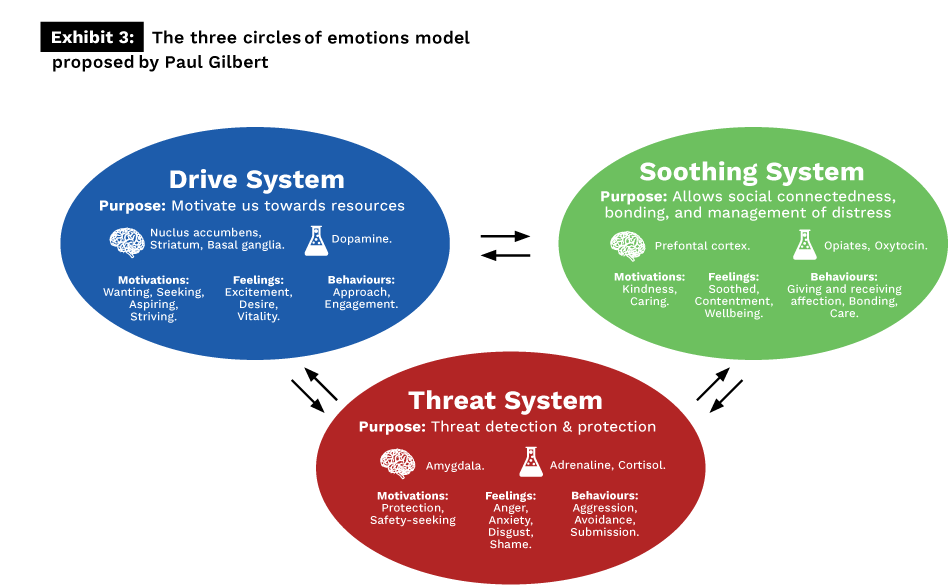
The three circles model is a theory proposed by Paul Gilbert5, Professor of Clinical Psychology at the University of Derby and founder of The Compassionate Mind Foundation. This model is central to Compassion Focused Therapy (CFT) and aims to understand the complexity of the brain’s systems and mechanisms for survival and growth. (Exhibit 3)
In summary, kindness enhances resilience by promoting positive emotions, fostering social connections, and inspiring others to be kind. By practising kindness, we not only improve our own well-being but also contribute to a more resilient and compassionate society.
Values, values intelligence, and enhancement of kindness-based resilience.
There are a host of values that can enhance kindness-based resilience in individuals and navigate through life’s ups and downs with adaptive intelligence.
The word “intelligence” comes from the Latin “legere”, containing the meanings of reading and choosing. Salvador Garcia (2018) has proposed the concept of “Values Intelligence”6. The concept can easily be added as another form of intelligence to the list of multiple intelligence proposed in the wonderful work of Howard Gardner.7
Coming from the state of full consciousness or mindfulness, is described as the wisdom to read the reality as it is and choose the values response or guides for action that seem to be most convenient for our full personal and collective development. Dolan (2020) also added that depending on the situations and the objectives of the person, the values need constant reflection of alignment and realignment8. Considering the so-called “Triaxial Model of Values” created by the two authors, these are the essential more intelligent values related to unconditional kindness:
Ethical Values
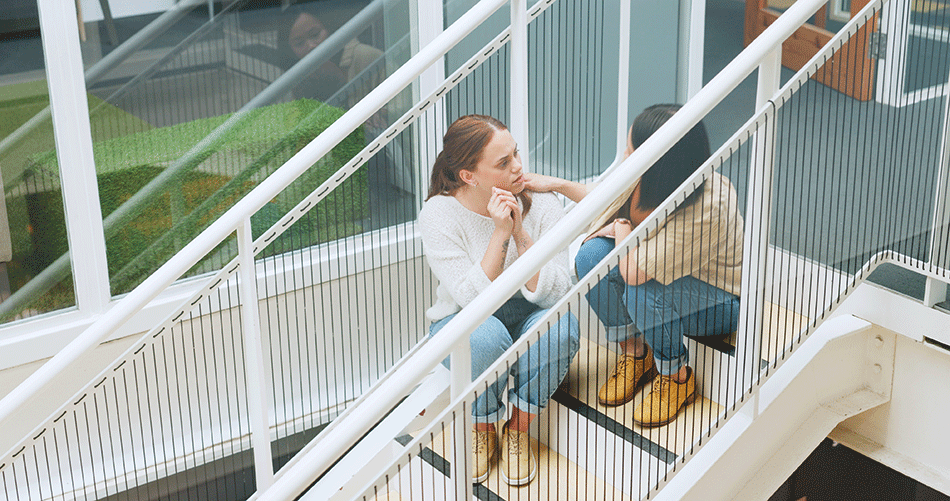
- Empathic love – This meta-value of unconditional kindness involves being able to understand and share the feelings of others. It allows individuals to connect with and support others with caring love, which can help to build social support networks and enhance resilience.
- Gratitude – Gratitude wish is intimately related to the concept of unconditional kindness treated in this paper. Cultivating a sense of gratitude can help individuals to focus on the positive aspects of their lives, even in difficult times. It can help to shift their perspective and foster a sense of resilience.
- Solidarity – Coming from the Latin solidus, solidarity or the ability to help in overcoming vulnerability, strengthens the quality of human relationships arises from empathy and unconditional kindness and generosity, and increases the capacity to face the vicissitudes of life.
- Generosity – The word “generosity” comes from the Latin generosus, which means abundant and well engendered. Generosity is a quality of unconditional kindness necessary for the evolution “from ego to eco”, from self-interest to common good, as proposed by Otto Shramer.9
- Forgiveness – Forgiveness is a powerful resilience medicine to heal emotional wounds. It starts from the idea of benevolence or wanting the good of the other, without excusing or forgetting the bad action suffered, and without ceasing to desire compensation for the damage. As Daniel Lumera, the Italian promoter of the International Kindness Movement10, says: “What do we want–to assert our reasons or to be free?”
Pragmatical Values
- Coherence and determination – Having a strong sense of purpose and self kindness helps individuals to persevere through challenges and setbacks. It is a meta-value of unconditional kindness to oneself, allowing one to stay focused on one’s goals and continue working towards them, even in the face of adversity, being conherent between what one thinks, feels, says and does.
- Adaptability – Being adaptable means being able to adjust and respond effectively to changing circumstances. It involves being openly kind to new ideas and approaches and being willing to learn and grow from experiences.
- Perseverance – Perseverance involves the ability to keep going and not give up, even when faced with obstacles or setbacks. It requires individuals to have a strong work and life ethic and a willingness to put in the effort required to achieve their goals in a kind or caring way with one self and others.
Emotional – Generative Values
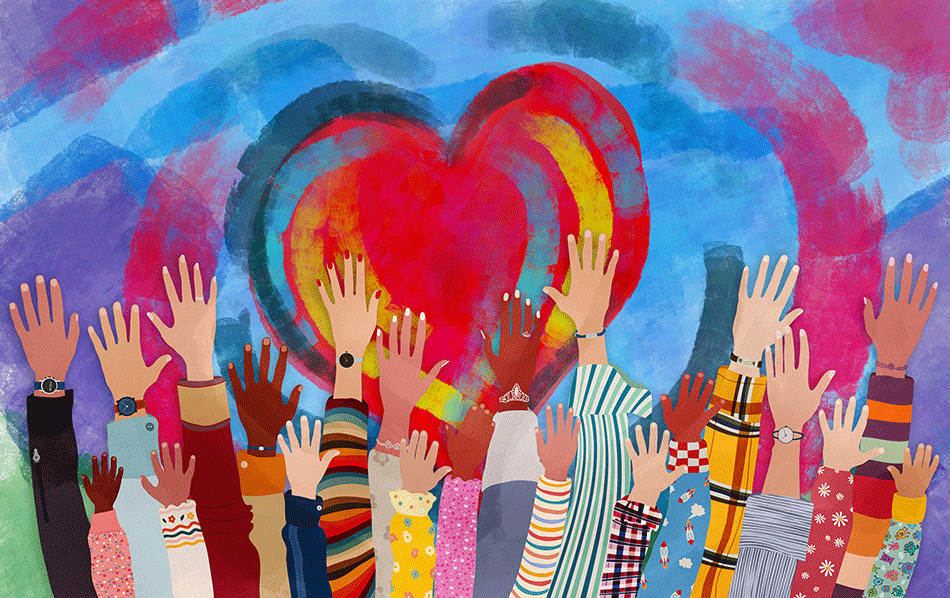
Emotional-generative values can be also called “poietic” for their quality of facilitating the self-emergence of new and beautiful possibilities for action.
- Trust and self-belief – Means having a strong sense of self-belief and self-confidence is a meta-value crucial for resilience. It allows individuals to trust in their own abilities and to have faith in their capacity to overcome challenges.
- Optimism – Being optimistic helps individuals to maintain a positive outlook, even in difficult circumstances. It allows them to see challenges as opportunities for growth and to believe in their ability to overcome obstacles.
- Patience – Coming from the possibility of being “in a peace mood”, patience is an emotional-generative value related to determination, adaptability and perserversance to achieve our medium- and long-term objectives
- Creativity – Creativity is an essential emotional-generative value to find new solutions to problems and to express with small but significant details the meta-value of unconditional kindness.
- Joy and celebration – The playful and conscious appreciation of everything we have accomplished and what we have learned. It is based upon gratitude and mindfulness, recognition of what has happened, seeing what we have done, and increasing our resilience about future events.
In other words, in this paper we propose to use the concept of “Unconditional kindness” as a meta-value that complements our previously proposed three axes deducted from the universe of values: the ethical, the pragmatic, and the emotional-generative (Triaxial Model of Values11).
In addition to an overall meta-value of unconditional kindness, we also propose the practice of a respective sub-meta-value in each of the axes. For example, the sub-meta-value of ethical intelligence will be empathic love; the sub meta-value of the emotional-generative or “poietic” intelligence axis will be trust and self-belief, and the sub-meta-value of pragmatic intelligence will be coherence and determination. An illustration of these concepts is summarised in Exhibit 4.
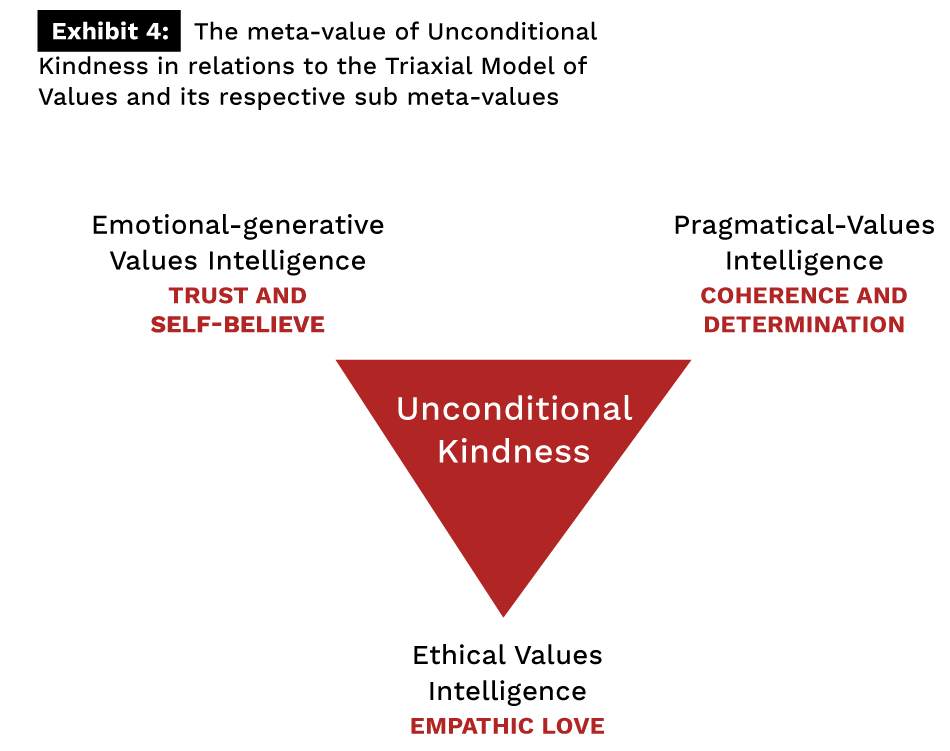 Now, let’s examine these sub-meta-values of unconditional kindness in relationships to resilience. Let’s start with LOVE. Although some experts claim that love is more a type of need than a value, regardless of its exact definition and classification, it seems to play a vital role in the development of resilience. Exhibit 5 shows some ways in which the ethical values intelligence of EMPATHIC LOVE can contribute to resilience:
Now, let’s examine these sub-meta-values of unconditional kindness in relationships to resilience. Let’s start with LOVE. Although some experts claim that love is more a type of need than a value, regardless of its exact definition and classification, it seems to play a vital role in the development of resilience. Exhibit 5 shows some ways in which the ethical values intelligence of EMPATHIC LOVE can contribute to resilience:
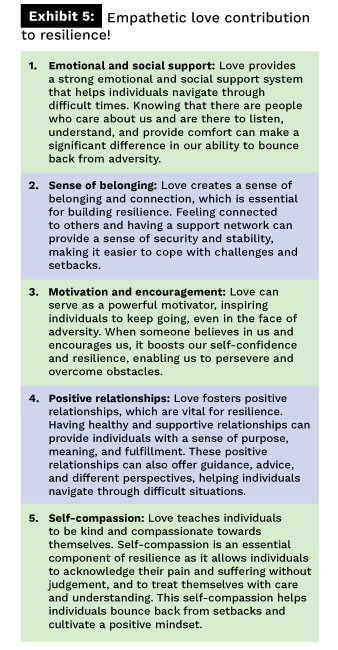 All in all, love plays a central role in enhancing resilience by providing emotional support, a sense of belonging, motivation, positive relationships, and self-compassion. It acts as a protective factor that enables individuals to cope with and overcome adversity more effectively.
All in all, love plays a central role in enhancing resilience by providing emotional support, a sense of belonging, motivation, positive relationships, and self-compassion. It acts as a protective factor that enables individuals to cope with and overcome adversity more effectively.
Trust is another key concept in the development of resilience. Although Dolan et al. claim that TRUST by itself is the “Value of Values”, or the “mother of all values”, it can also be considered a sub-meta-value of the emotional-generative axis of the triaxial model12.
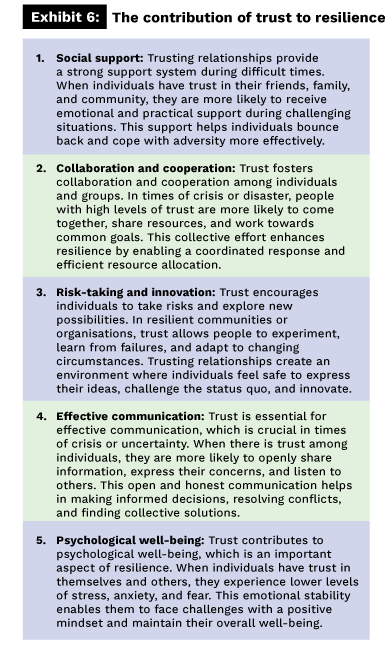 Trust plays a crucial role in enhancing resilience in various aspects of life and it is especially important at times of dystrophy.
Trust plays a crucial role in enhancing resilience in various aspects of life and it is especially important at times of dystrophy.
Overall, trust plays a fundamental role in enhancing resilience by promoting social support, collaboration, risk-taking, effective communication, and psychological well-being. Building and maintaining trust in relationships, communities, and organisations is crucial for fostering resilience in the face of adversity.
The last sub-meta-value of pragmatic intelligence referes to COHERENCE AND DETERMINATION. It refers to the state of being consistent, logical, and connected in one’s thoughts, actions, and behaviours. It implies that there is a clear and logical flow in the way someone communicates, makes decisions, and executes tasks. When someone demonstrates coherence in action, they can effectively align their intentions, words, and actions, creating a sense of harmony and integrity. This can lead to improved performance, better relationships, and a stronger sense of self.
Coherence in action involves aligning one’s beliefs, values, and behaviours to create a unified and purposeful approach to life. When individuals have coherence in action, they can make decisions and take actions that are in line with their goals and values, leading to a greater sense of fulfillment and satisfaction.
Coherence in action and resilience are closely related, as they both contribute to overall well-being and success in life. When individuals have coherence in action, they are more likely to have a strong sense of self and purpose, which can enhance their resilience. Similarly, resilience can help individuals maintain coherence in action by allowing them to overcome obstacles and stay focused on their goals.
Together, coherence in action and resilience enable individuals to navigate life’s challenges with greater ease and effectiveness. They provide a solid foundation for personal growth, emotional well-being, and success in various areas of life, including relationships, work, and personal development.
Practical principles for practising self-kindness during a war
Why should we begin by taking care of ourselves?
Just as in an emergency during an air disaster, where you must first put on your own oxygen mask and then be able to help the most vulnerable children or other people, the response of unconditional care or kindness in the case of a war disaster must start with yourself.
Being kind to oneself is an essential aspect of personal well-being and happiness. By treating ourselves with kindness, we cultivate self-compassion, self-acceptance, and self-love. This involves acknowledging our strengths and weaknesses, embracing our imperfections, and practising self-care.
When we prioritise our own well-being, we are better equipped to extend kindness to others. By taking care of ourselves physically, emotionally, and mentally, we have more energy and resources to share with those around us. This can be in the form of offering support, lending a listening ear, or showing empathy and understanding.
Furthermore, being kind to ourselves sets an example for others to follow. When people witness our self-compassion and self-care practices, they are more likely to adopt similar behaviours. By modelling kindness towards ourselves, we inspire and encourage others to do the same.
Ultimately, by being kind to ourselves first, we create a positive ripple effect. When we prioritise self-kindness, we not only enhance our own well-being but also contribute to creating a kinder and more compassionate world.
1. Keep the Inner Calm
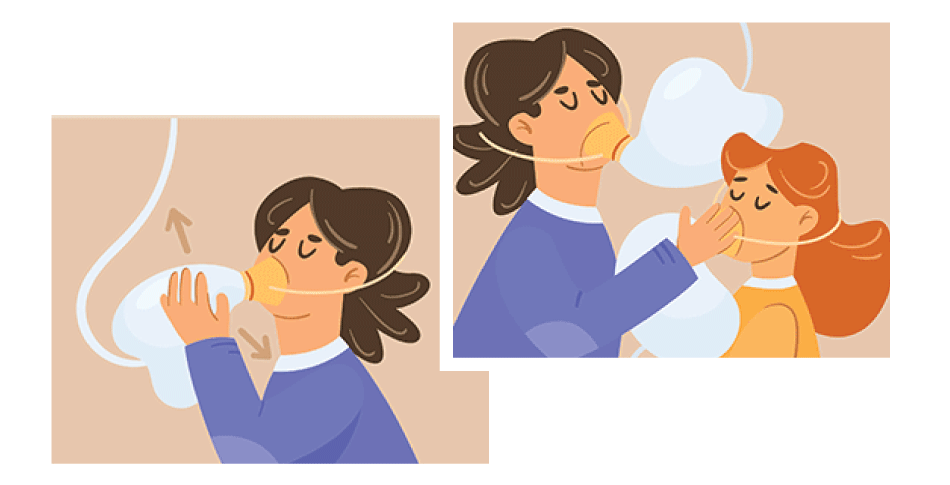
- Practise mindfulness: Try to stay grounded and situate yourself in the reality of the present, contemplating the horror face to face. Try to become aware of the breath, and go within oneself “here and now”, connecting with the inner centre of peace, self-compassion, and kindness.
In situations of relative calm, try to live small moments of mindfulness or full consciousness about very simple but meaningful things, such as when sipping water, when eating something, when giving or receiving a caress from a loved one, when thanking someone for something, when receiving someone’s support or thanks, when remembering a positive episode in life…
Obviously, this soothing response of calm and soothing in the face of disaster and suffering of self and others is more likely to occur in people trained to meditate, but it is not impossible in any circumstance.
If we panic or succumb to hatred and thirst for revenge, we will not be able to think adequately to face the situation with the best possible guarantees of physical and emotional survival for ourselves and others.
No doubt, maintaining calm in times of war can be extremely challenging, and some even call it a utopia. However, it is essential for survival and our own well-being. Here are further eutopic strategies that can help: - Stay informed: Knowledge about the situation can help reduce fear and uncertainty. Stay updated with reliable news sources to understand the status, developments, and potential risks. However, be cautious about consuming excessive or sensationalised information, as it can heighten anxiety.
- Create a safety plan: Develop a plan for yourself and your loved ones to ensure their safety during wartime. Identify safe areas, emergency contacts, and evacuation routes. Having a plan in place can provide a sense of control and reassurance.
- Practise self-care: Take care of your physical and mental well-being. Engage in activities that help you relax and reduce stress, such as exercising, meditating, or pursuing hobbies. Prioritise self-care to maintain emotional stability and resilience.
Seek support: Connect with others who are going through similar experiences. Share your concerns, fears, and emotions with trusted friends, family members, or support groups. Talking about your feelings can help alleviate stress and provide a sense of solidarity. - Maintain routines: Establishing daily routines can provide a sense of normalcy and stability amidst chaos. Stick to regular schedules for meals, sleep, work, or other activities as much as possible. Routines can help create a sense of control and reduce anxiety
- Limit exposure to violence: Minimise exposure to violent images, videos, or graphic content. Constant exposure to violence can increase stress levels and desensitise individuals. Instead, focus on positive aspects of life, engage in uplifting activities, or seek out inspiring stories.
- Seek professional help if needed: If you find it difficult to cope with the stress of war, do not hesitate to seek professional help. Mental health professionals can provide guidance, support, and coping strategies tailored to your specific needs.
Remember, staying calm in times of war is a gradual process, and it’s normal to experience ups and downs. Be patient with yourself and others and focus on the strategies that work best for you.
2. Recognise and Express What You Feel
Autodidactic exercise: Try to name the emotions you are feeling and try to share them with others, whether it is fear, hatred, anger, helplessness, indignation, humiliation, vulnerability, sadness, guilt, revenge, affection, and concern for those closest to you, or a combination of several of these.
In other words, naming emotions and expressing them can indeed be a powerful strategy for resilience during times of war. Here are some clear emotions that individuals may experience during such challenging times and converting them into resilience:
- Fear: Acknowledging and naming fear can help individuals understand their own vulnerabilities and take necessary precautions to ensure their safety.
Anger: Expressing anger in a constructive manner can help individuals channel their frustrations towards positive actions, such as advocating for peace or seeking justice for those affected by war. - Sadness: Recognising and expressing sadness can allow individuals to grieve for the losses experienced during war, fostering healing and emotional resilience.
- Empathy: Cultivating empathy towards others affected by war can help individuals build connections and support networks, fostering a sense of community and resilience.
- Hope: Holding onto hope and expressing it can serve as a driving force during times of war, providing individuals with the strength to endure and work towards a better future.
In sum, by naming and expressing these emotions, individuals can better understand their own emotional landscape, seek support from others, and develop strategies to cope with the challenges of war. It is important to note that emotions are complex and multifaceted, and individuals may experience a wide range of emotions during times of war.
3. Maintain Life Hope
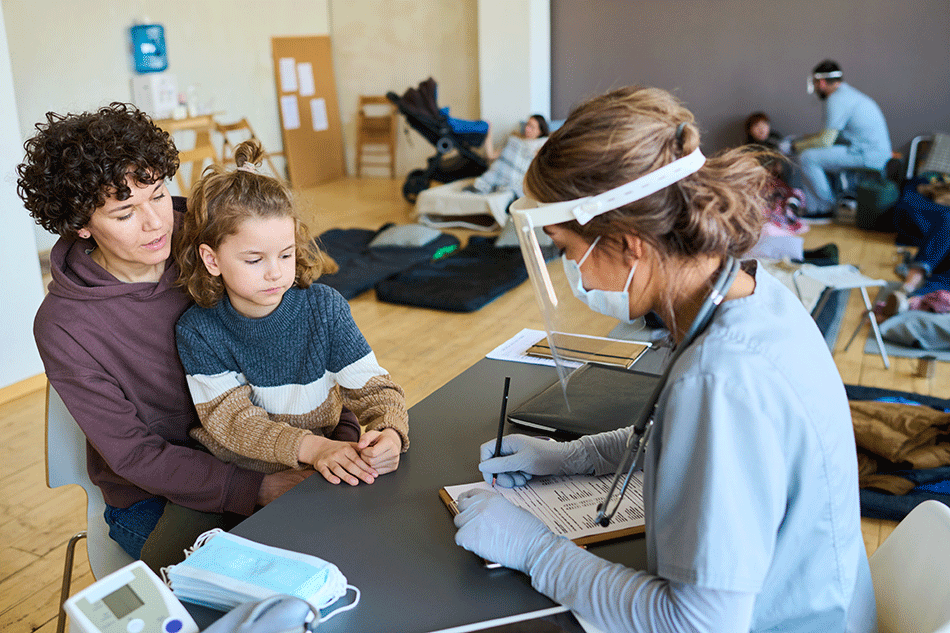
To realise that one is still alive, to sustain the painful present, to activate all the internal resources, emotions, values, and inner strength that one has to maintain the hope that one can get out of the horror, proposing different objectives and perspectives in the short and medium-long term and thinking about learning and personal growth after the hecatomb.
One needs to re-emphasise the role that hope plays in enhancing resilience during times of war. It provides individuals with a sense of purpose, motivation, and optimism, enabling them to endure and overcome the challenges and adversities associated with war.
Here are some ways in which hope enhances resilience:
- Psychological well-being: Hope helps individuals maintain a positive mindset and outlook, even in the face of extreme hardship. It allows them to believe in a better future and envision possibilities beyond the current situation. This psychological well-being helps individuals cope with stress, trauma, and anxiety during war.
- Motivation and determination: Hope fuels motivation and determination to persevere through difficult circumstances. It gives people the strength to keep going, despite the immense challenges and sacrifices required during war. Hope instils a sense of purpose and empowers individuals to fight for a better future.
- Resisting despair: War often brings about a sense of despair and hopelessness. However, hope acts as a counterforce to despair, enabling individuals to resist giving in to negative emotions. It provides a sense of resilience and the belief that things can and will improve, even in the darkest of times.
- Building community and support: Hope can bring people together, fostering a sense of unity and solidarity. During war, individuals with hope often seek out and connect with others who share their optimism and determination. This sense of community and support is crucial for resilience, as it provides a network of individuals who can offer emotional support, encouragement, and practical assistance.
- Adapting and finding solutions: Hope encourages individuals to think creatively and find innovative solutions to the challenges posed by war. It promotes resilience by enabling individuals to adapt to changing circumstances, identify opportunities for improvement, and work towards positive change.
Overall, hope acts as a powerful force during times of war, enhancing resilience by providing individuals with the mental and emotional strength to endure, overcome, and work towards a better future.
4. Be at the Service of Others
To put ourselves at the service of those closest to us in order to take care of their immediate physical and emotional survival:
- Doing whatever we can in the best interests of physical survival in the most supportive, generous, collaborative and creative way possible.
- Listening to others attentively as much
as possible.
Being at the service of others can help create resilience during times of crisis such as war because it fosters a sense of purpose, builds social connections, and promotes a sense of unity and collective responsibility. Here are a few reasons why:
- Purpose and meaning: Serving others during a crisis provide individuals with a sense of purpose and meaning in their lives. It gives them a reason to keep going and persevere through difficult times. By focusing on helping others, individuals can find solace in knowing that their actions are making a positive difference in the lives of others, even amidst the chaos and destruction of war.
- Social connections: Serving others during a crisis often involves working together in teams or communities. This creates opportunities for individuals to build strong social connections and support networks. These connections can provide emotional support, encouragement, and a sense of belonging, all of which are crucial for resilience during times of crisis. By working together, individuals can share their burdens and find strength in the collective effort.
- Unity and collective responsibility: Serving others fosters a sense of unity and collective responsibility. During times of war, communities often come together to support and protect each other. By actively participating in service, individuals contribute to the overall well-being of their community, which strengthens the bonds between community members. This sense of unity and collective responsibility can help individuals withstand the challenges of war and create a resilient community whose members supports and uplifts each other.
- Psychological benefits: Serving others can have positive psychological effects on individuals. It can provide a sense of satisfaction, fulfillment, and a boost in self-esteem. These positive emotions and feelings can act as protective factors during times of crisis, helping individuals cope with stress, trauma, and adversity more effectively.
Overall, being at the service of others during times of crisis like war can help create resilience by providing individuals with a sense of purpose, building social connections, fostering unity, and promoting positive psychological well-being. These factors contribute to the ability to bounce back, adapt, and persevere through challenging circumstances.
5. Transform and Channel.
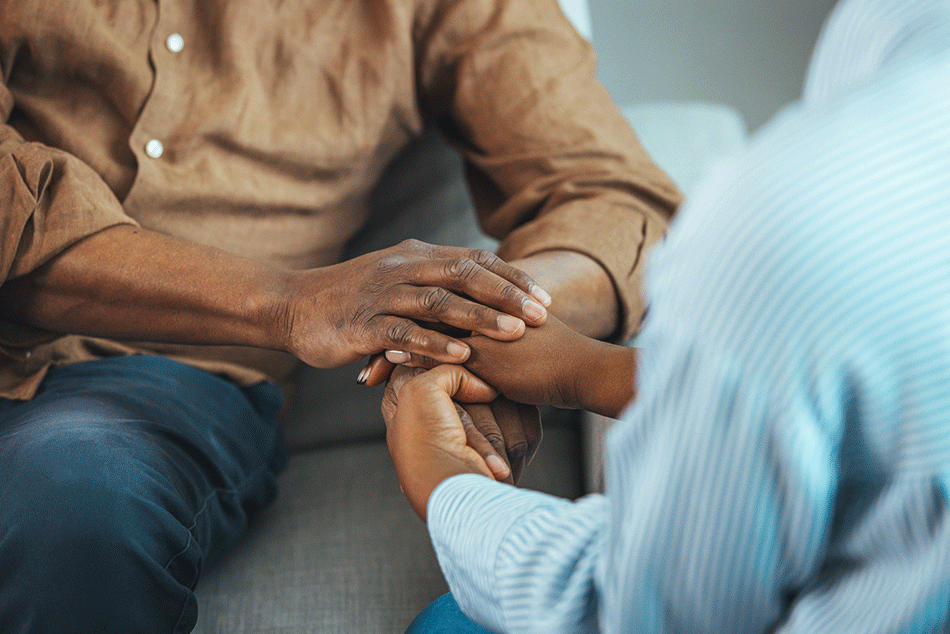
Although it is practically impossible to justify or excuse situation of violence nor is it easy to forget the damage caused, the most radical, extraordinary, powerful, practical and emotionally healthy response of kindness might be a proper medium to do so, and engaging in it for the long term leads to transforming and channeling the emotional energy of fear and rage into compassionate energy of forgiveness on behalf of the aggressor. The reparation of the damage caused, and construction of new realities of future may coexists.
From a state of serenity and the practice of mindfulness and unconditional kindness, it is possible to think re imagine and rewrite realty. Afterall, reality is truly in the eye of the beholder. Here are a few examples:
- “No truth is totally true; it is only partly true at best. Do not categorise, do not judge, do not align yourself with any ideology. What I think and believe today is different from what I thought and believed some time ago and what I will think and believe years from now…”
- Truths can be considered relative and subjective because they are shaped by individual perspectives, beliefs, and experiences. Different people may perceive and interpret the same information or situation differently, leading to varying conclusions about what is true. Cognitive biases and personal biases can also influence how individuals perceive and accept certain truths. These biases can be based on cultural, societal, or personal factors, which can lead to different understandings of what is true. Furthermore, truth can be influenced by the context in which it is presented. The same information can be interpreted differently depending on the cultural, social, or historical background of the person receiving it. This means that truth can be relative to a particular context or situation.
- Additionally, truth can also be subjective because it often involves personal beliefs and values. What one person considers true may be different from what another person believes to be true, based on their own values and beliefs. This subjectivity makes truth a matter of personal perspective and perception.
In summary, truths are relative and in the eye of the beholder because they are influenced by individual perspectives, biases, experiences, and cultural contexts.
“If I had been born in a different place, had lived through different social circumstances, different friends, different family, different environment, different education… If I had suffered certain abuses, treatment, abandonment, contempt, discrimination… What would I be like today? Perhaps like the aggressor who is now killing us…”.
Thus, forgiveness is possible.
In fact, we are all united with everyone from the genetic matter that constitutes us as the human species of Homo sapiens. We all come from the first living beings that existed. We are all biologically interdependent siblings.
Hopefully we Homo sapiens will one day evolve into “Homo amabilis”, being aware that the brain response of unconditional kindness is much more convenient for our survival as a species than the response of endless revenge or violence.
An apparent paradox: War crisis and despair leads to growth
While it sounds like an unbelievable paradox, research shows that the aftermath of crises, such as wars and other disasters can lead to growth and renovation because they force individuals or societies to reassess their current situation and make necessary changes. When faced with a crisis or feeling despair, people are often pushed out of their comfort zones and are forced to confront their weaknesses, limitations, or failures. This can lead to a period of self-reflection and introspection, where individuals or societies evaluate their values, priorities, and goals. During this process, people may discover new strengths, develop resilience, and gain a deeper understanding of themselves and the world around them. They may also become more open to change and more willing to take risks to overcome the crisis or despair they are facing.
Additionally, crisis and despair can bring people together and foster a sense of community. In times of adversity, individuals often find support and solidarity with others who are going through similar experiences. This shared experience can create a sense of unity and motivate people to work together towards finding solutions and creating positive change.
Ultimately, crisis and despair can serve as catalysts for growth and renovation because they challenge individuals and societies to adapt, innovate, and evolve. They can lead to new perspectives, new ideas, and new approaches that can bring about positive transformation and renewal.
Conclusion
Resilience during times of war and dystopia is indeed a significant challenge. The stress of armed conflict creates a multitude of physical, emotional, psychological, political and economic hardships that can severely test the resilience of individuals and communities.
War often results in the loss of loved ones, destruction of homes, and displacement of communities. These traumatic experiences can have long-lasting effects on individuals, making it difficult to bounce back and rebuild their lives. During times of war and conflict, people live in constant fear and uncertainty. The threat of violence, displacement, and loss can create a sense of helplessness and anxiety, making it challenging to maintain resilience.
Despite these challenges, resilience can still emerge during times of war and conflict. Communities often come together to support one another, find ways to adapt, and rebuild their lives. Resilience during these times is about finding strength in the face of adversity, adapting to new circumstances, and seeking support from others. It requires a combination of individual and collective efforts to overcome the challenges and rebuild lives in the aftermath of war and conflict.
While there are various approaches to enhancing resilience, this paper suggests a distinctive perspective centred around unconditional kindness. The emergence of unconditional kindness involves showing empathy, compassion, and support towards oneself and others, without any conditions or expectations. This approach to resilience recognises the importance of fostering positive emotions, building strong relationships, and cultivating a sense of love and belonging.
Firstly, practicing unconditional kindness towards oneself can significantly contribute to resilience. This involves being self-compassionate and understanding when facing challenges or setbacks. Instead of being self-critical or judgmental, individuals can offer themselves kindness and understanding, recognising that everyone makes mistakes and experiences difficulties. This self-compassion helps in developing a resilient mindset by promoting self-acceptance, self-care, self-confidence and, ultimately, self-esteem.
Secondly, extending unconditional kindness to others can also enhance resilience. By offering empathy and support to those around us, we create a sense of connection and belonging. This social support network becomes crucial during tough times, as it provides a safe space to share experiences, seek advice, and receive emotional support. Acts of kindness towards others not only benefit them but also foster positive emotions within us, leading to increased resilience.
Furthermore, promoting a culture of unconditional kindness within communities and organisations can have a profound impact on resilience. When kindness becomes a shared value, individuals feel supported, valued, and motivated to overcome challenges. This can be achieved through initiatives such as kindness campaigns, peer support programmes, or fostering a positive, participative and inclusive work environment.
As Homo sapiens, we need the resilient re-evolution of unconditional kindness!
About the Authors
 Dr. Salvador García Sánchez is a medical doctor and social psychologist. He is a professor at the University of Barcelona. He is a co-founder of the Butterfly Movement, a eutopic alliance of values and conversations between old and young generations aiming at pollinating unconditional kindness to self and others. Creator of the “Values Intelligence” model and the “Cards on the Table” conversational tool.
Dr. Salvador García Sánchez is a medical doctor and social psychologist. He is a professor at the University of Barcelona. He is a co-founder of the Butterfly Movement, a eutopic alliance of values and conversations between old and young generations aiming at pollinating unconditional kindness to self and others. Creator of the “Values Intelligence” model and the “Cards on the Table” conversational tool.
 Dr. Simon L. Dolan has completed his doctorate at the University of Minnesota in HRM and Work Psychology. He is presently a full professor and senior researcher at Advantere School of Management. He is a prolific writer (over 85 books and more than 150 articles published in scientific journals)) and founder of the think tank “Global Future of Work Foundation,” in which he serves as the president. He is the creator of the coaching and leading by values philosophy, methodology, and tools. More: www.simondolan.com
Dr. Simon L. Dolan has completed his doctorate at the University of Minnesota in HRM and Work Psychology. He is presently a full professor and senior researcher at Advantere School of Management. He is a prolific writer (over 85 books and more than 150 articles published in scientific journals)) and founder of the think tank “Global Future of Work Foundation,” in which he serves as the president. He is the creator of the coaching and leading by values philosophy, methodology, and tools. More: www.simondolan.com
References
- https://en.wikipedia.org/wiki/Dystopia
See: List of ongoing armed conflicts, https://en.wikipedia.org/wiki/List_of_ongoing_armed_conflicts - https://en.wikipedia.org/wiki/Ch%C3%B6gyam_Trungpa
- https://www.stephengilligan.com/
- Gilbert, P. “An Evolutionary Approach to Emotion in Mental Health With a Focus on Affiliative Emotions”. Emotion Review 7(3). July 2015
- Salvador Garcia (2018) Inteligencia de Valores. Alicante: ECU. English version forthcoming: “Values Intelligence: a good step inside and three steps forward”.
- Howard Gardner (1993) Multiple Intelligences. Basic Books.
- Simon L. Dolan (2020) The secret of coaching and Leading by Values: How to ensure alignment and realignment (Routledge).
- https://www.clubofrome.org/publication/earth4all-scharmer/
- https://www.theworldkindnessmovement.org
- See: García, S. and Dolan, S (1997) La Dirección por Valores: la gestión del cambio más allá de la dirección por objetivos (McGraw Hill); Dolan S.L., Garcia S., Richely B (2016) Managing by Values:
- A corporate Guide to Living, Being alive and making a living in the 21st Century (Palgrave MacMillan).
- Dolan, S.L. Brykman, K., (2024) The Art and Science of Building Trust (forthcoming in 2024).



